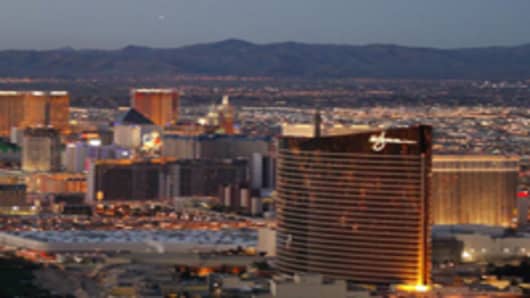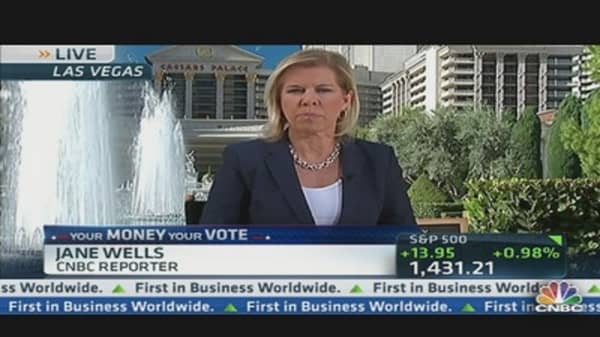Nevada has the highest unemployment rate in the nation, and its six electoral votes are up for grabs this election.
Most of the state's registered voters are Democrats, but Republicans have been spending heavily. None more so than Las Vegas Sands CEO Sheldon Adelson and his wife, who've donated more than $20 million to help get Mitt Romney to the White House, according to OpenSecrets.org.
Some voters have long memories, still smarting from President Barack Obama's quip in 2009 that, "You can't go take a trip to Las Vegas or go down to the Super Bowl on the taxpayers' dime."
Convention business was already hurting in the downturn, and it plummeted after that.
However, the economy is improving, slowly.
Unemployment is still very high at 11.8 percent, but it's down from a peak of 14 percent. Business on the Las Vegas Strip is up low single digits so far this year, and the number of conventions is up 16 percent. (Read More: How the Unemployed Plan to Vote in Election.)
But as gaming CEOs like Adelson and Steve Wynn spend money trying get business-friendly candidates elected, another local CEO is gambling on a bold experiment in Las Vegas jobs creation, spending $350 million of his own fortune.
"There's a few different goals," said Zappos CEO Tony Hsieh. "One is to create the most community focused large city in the world."
Hsieh doesn't think small, having grown Zappos into a billion dollar company now owned by Amazon. He said Zappos has outgrown its headquarters in Henderson, Nevada, so he is moving the 1,300 employees into the old Las Vegas City Hall and transforming the rundown neighborhood around it. (Read More: State By State: Election Day Viewer's Guide.)
His Downtown Project plans to spend $100 million buying buildings in the area, $100 million building housing in the neighborhood, $50 million investing into 100 to 200 small businesses, $50 million investing in tech startups, and $50 million in education projects.
He wants to turn downtown Vegas, north of the Strip, into "the co-learning and co-working capital of the world...if you think of a city as a startup, you don't get many opportunities like that in a lifetime."
To receive some of the $350 million from Downtown Project, business owners have to be willing to live in the neighborhood Hsieh is revitalizing and give something back to the community. Most investments are $300,000 to $500,000, and the startups have to give Downtown Project a stake in their firms.
Hsieh said 10 tech start-ups have already relocated, including Romotive, which makes small $150 robots. Many newcomers stay in crash pads Hsieh has in a luxury condo overlooking his future city-within-a-city, and his own apartment is covered with post-it notes filled with ideas.
One of the first small businesses to receive an investment is Eat, a new restaurant across the street from a vacant lot and near a tattoo parlor. (Read More: The Election Could Affect the Sale of Your Business.)
"I was pretty much done with Vegas," said chef and owner Natalie Young. A friend introduced her to Hsieh. "First words out of his mouth were, 'What size restaurant do you want?"
After writing several business proposals, Young said they finally came to terms. Hsieh's group has provided 100 percent of the financing for the restaurant and is 50 percent owner.
Chef Young has hired 20 employees and said she's cash-flow positive after the first month. "These are businessmen and they are taking a chance by investing in me and my vision ... so it has to make sense. I can't spend more than I make. I have to pay them back."
(Read More: Scenes From the 2012 Election.)
She said some have questioned her partner getting half the profits. She sees the glass half full.
"50 percent of something is better than 100 percent of nothing," Young said with a laugh. "Do your math. I don't know, it works out for me."
Tony Hsieh said the neighborhood has already changed within the last year, and he expects it to be very different within five years.
"Most people divide the world into you either have to be this money losing charity, or you have to be maximizing profits," he said. "We think there's actually a really good in-between, which is what we're trying to do. We're trying to do stuff that's good for the community but also in the long term, we think it will be a great return on investment."
—By CNBC's Jane Wells
@janewells





